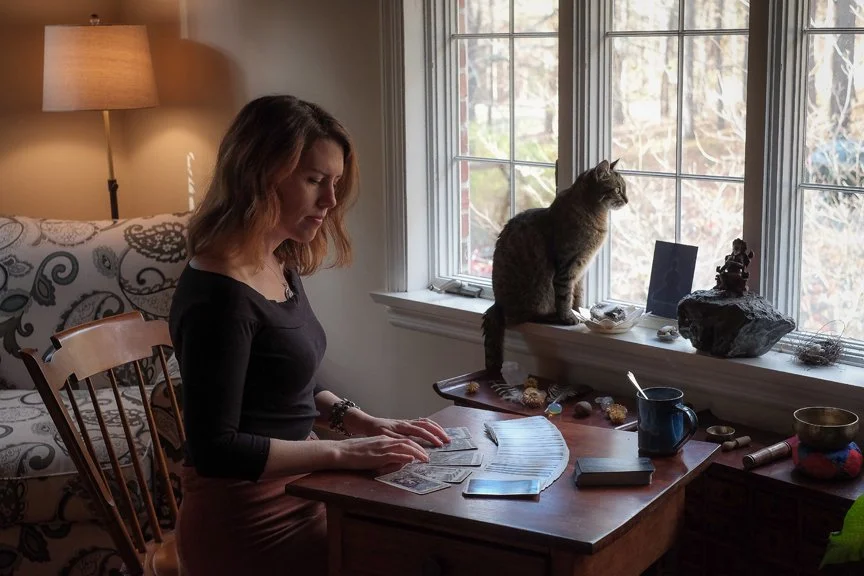A WITCH BY ANY OTHER NAME…
When I was in college studying literature and poetry, I used to fantasize about being able to write openly and freely on the subjects I was really passionate about. But at that time, if you went around talking freely about communing with tree spirits or doing magic with plants, no one took you seriously, or worse: your credibility was pretty much shot. I feared being open about my beliefs would cost me a future job or lose me a possible future publication.
When I first started writing about Tarot and plants, it was only in my journal. A private matter, just for me. I considered going back to school for ethnobotany, thinking perhaps under that academic guise I could explore my botanical ‘woo-woo’ in secret and still garner social respectability. But somewhere deep down I knew as long as I wore the academic mask and kept my feet firmly planted on the safe side of intellect I would be betraying my deeper, more authentic self. I might gain respect and career success, but I would be invalidating and abandoning my intuition, my dream-self, and thus suffocating my inner spark - something I have not been willing to do.
It’s still not easy for me to let go of the internalized judgment and shame I have around my witchy-side. Coming out of the broom closet is still scary! I was raised in a very traditional religious household, where words like intuition, paganism, divination etc were off limits and dangerous. The limits of what was acceptable were not always spoken, but it's amazing how easily as children we learn to read a room and instinctively know what puts us at risk of rejection and what gives us that sense of belonging. This, in fact, was one of the first ways I used my intuition.
Even after all these years, I still get butterflies when I hit publish on my blog or post a photo on social media. It’s a radical act for me to publish anything on the topic of botanical magic. That’s why this week I’m feeling all the more proud of myself for contributing to the Plant Wonder Collective’s Spring edition of the Botanical Anthology, which is now out for sale. I’m beyond proud to stand alongside so many other brave trailblazer herbalists in this anthology- women who defy cultural norms and naysayers and who dare to embrace the wonder of the botanical world, shamelessly, wholeheartedly, free.
(Botanical Anthology, Spring Edition is on sale now! Get your copy of this BA and share in all the herbal magic and wonder at plantwondercollective.com)
There are many labels or names some might use to define what I’m into. Witchcraft, paganism, druidry, animism, alchemy, mysticism, hermeticism, oracular arts, seership - there are so many different labels. To me, they all sound like other people’s words for things that make them feel uncomfortable. I've tried many of them on for size. Some feel nice, like fun costumes. None of them really feel they fit like a glove consistently. To me, being a witch just mean I’m being myself, doing what comes naturally. Witchcraft is the instinct all women (and men, too, for that matter) have to create and to manifest, through an act of intention or will, our desires into material form. It’s not a special superpower so much as a talent some of us choose to hone.
The truth is I hate to be defined. Like Madeline Miller’s Circe, I think it’s easier to define magic by what it is not. In her stunning novel that captures so much of what is in my heart, Circe says “Let me say what sorcery is not: it is not divine power, which comes with a thought and a blink. It must be made and worked, planned and searched out, dug up, dried, chopped and ground, cooked, spoken over, and sung.” Sorcery, if I can try my humble hand at penning a definition here, is mostly hard work. It’s dedication. It’s butt-on- cushion-focused-meditation until your legs fall asleep. It’s devotional uprising, day after night, night after day. It’s loneliness. It’s the heartbreaking work of embodiment - the glorious, relentless striving to gracefully balance the tension of embodied imperfection of what is and what has been with the conscious perfection of what is possible. Mostly, witchcraft means doing a lot of dishes and compost.

